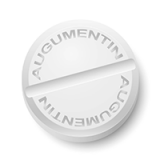

Buy Augmentin Generic Online at Cheap Price - Chose the Necessary Amoxicillin & Clavulanate Dosage Below
Augmentin Generic is a different name for the same Amoxicillin & Clavulanate ingredients. The content of Augmentin Generic pills is absolutely the same as in the branded Amoxicillin & Clavulanate analogue.
Rate Your Experience & Write a Review About This Medicine
Augmentin Generic contains two active ingredients: Amoxicillin and Clavulanic acid.
Amoxicillin is semi-synthetic Penicillin that has a broad spectrum of action. Clavulanic acid is an inhibitor of beta lactamase, an enzyme that some bacteria produce to break down Penicillin and other beta-lactam antibiotics. Combining Clavulanic acid and Amoxicillin protects the second ingredient from degradation thus expanding its spectrum of action. The combination of Amoxicillin and Clavulanic acid acts bactericidal against a large number of gram-positive and gram-negative bacteria (including those that produce beta lactamase), such as:
Augmentin is not effective against certain strains of Enterobacter spp. (in vitro), as well as Citrobacter spp., Morganella spp., Serratia spp. and Pseudomonas aeruginosa. The drug should not be used in the treatment of infections in which Amoxicillin alone is effective.
After oral administration, both active substances of the drug are well absorbed from the gastrointestinal tract and distributed well in tissues and body fluids. They pass poorly through the blood-brain barrier. They pass the placental barrier and are excreted in breast milk. The elimination half-life is 1.3 hours for Amoxicillin and 1 hour for Clavulanic acid. The highest amount of drug (50-70% Amoxicillin and 25-40% Clavulanic acid) is excreted after 6 hours in urine in unchanged form.
Augmentin Generic used in the treatment of infections caused by bacteria susceptible to the combination of Amoxicillin and Clavulanic acid, including infections caused by gram-negative and gram-positive as well as anaerobic bacteria. It is used to treat following infections:
It is also used for the prevention of post-operative infections.
Usual recommended dose in the treatment of all types of infections in adults and children weighing more than 40kg is 1000mg (875mg Amoxicillin and 125mg clavulanic acid) two times a day.
In children weighing less than 40kg, the dosage should be adjusted according to child's body weight.
A dosage adjustment is not needed in elderly patients.
It is best to take the Augmentin pill at the beginning of the meal in order to reduce the incidence of gastrointestinal side effects (nausea, vomiting, anorexia, and diarrhea).
Augmentin should not be used in patients with known hypersensitivity to Amoxicillin, Ampicillin, Cephalosporins (Cephalexin, Cefaclor, Cefepim, Cefpodoxime, Ceftriaxone, and others), and Penicillin. Patients who are allergic to mentioned drugs are likely to be allergic to Augmentin as well. If you notice symptoms of an allergic reaction, you should notify your doctor right away.
Clinical studies have reported that patients who have kidney damage may experience convulsions if they take Augmentin. Therefore, this drug should be used with extra precaution in patients who have kidney damage.
In the case of suspected infectious mononucleosis, the use of Augmentin should be avoided, because Morpheaform rash may occur.
The simultaneous administration of Allopurinol with Augmentin may increase the risk of allergic skin reactions. The prolonged use of the drug may occasionally lead to the increased growth of insensitive microorganisms.
Generalized erythema-associated fever has been reported in patients who are taking Augmentin Generic.
Liver damage has also been reported in patients (men and elderly patients) who are taking Augmentin for longer periods of time. Liver damage may be life-threatening. Inform your doctor if you notice symptoms of an allergic reaction, such as: skin rash, urticaria, itchy skin, swelling of the lips, facial edema, and difficulty breathing.
All antibiotics, including Augmentin, may disrupt gastrointestinal flora and cause colitis. Colitis is the inflammation of the intestines due to an increased growth of bacteria. It can cause severe diarrhea which may lead to dehydration. If you experience diarrhea that does not go away after few days, inform your doctor.
Prothrombic time may be prolonged in patients who are taking Augmentin. Patients who are taking anticoagulants (such as Warfarin) must not use Augmentin Generic concomitantly as this increases the risk of bleeding.
Patients with impaired renal function must take lower doses than healthy adults. The dose should be adjusted according to creatinine clearance. Patients who do not drink enough water may experience crystalluria - developing of crystals in urine which may cause damage to the kidneys. If you notice difficulty urinating, you should inform your doctor.
Severe skin adverse reactions (such as Stevens-Johnson syndrome and toxic epidermal necrolysis) have been reported in patients who are taking Augmentin. Since these changes can lead to kidney damage and may be life-threatening, you should notify your doctor if you notice any changes on the skin.
Augmentin Genericmay cause following side effects:
Inform your doctor if you notice any adverse effects.
There are 8 major, 50 moderate and 15 minor interactions known so far. Augmentin should not be used concomitantly with following medicines:
Although it is not yet confirmed in clinical trials, Augmentin is likely to interact with anticoagulant drugs, such as Warfarin. The concomitant use may increase the risk of bleeding.
You should always inform your doctor if you are taking any medicines, including over-the-counter products that can be obtained without a prescription.